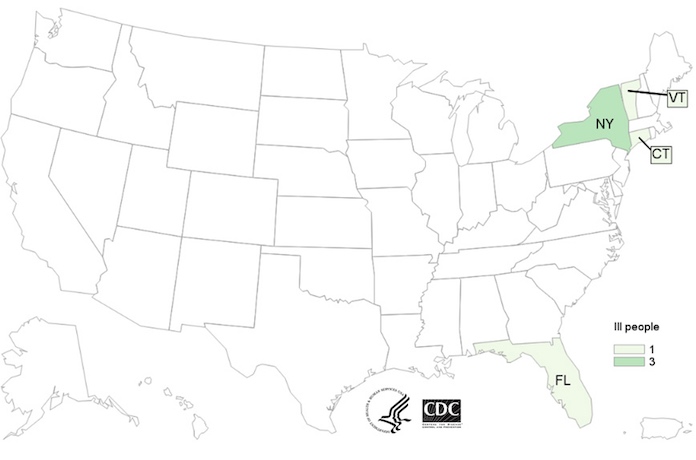The CDC has announced a Listeria monocytogenes outbreak is linked to soft raw milk cheese produced by Vulto Creamery in Walton, New York. Two people have died and six are sickened in this outbreak.

The case count by state is: New York (3), Florida (1), Vermont (1), and Connecticut (1). Illnesses began on September 1, 2016. All six patients were hospitalized. One person from Connecticut and one person from Vermont died. One illness was reported in a newborn. Infants can be born with Listeria monocytogenes infections when their mothers eat products contaminated with the bacteria. The bacteria can pass through the placenta because the mother’s immune system response attacks the placenta.
The outbreak strain of Listeria monocytogenes was identified in samples taken from three intact wheels of Ouleout cheese collected from Vulto Creamery. On March 7, 2017, Vulto Creamery recalled all lots of Ouleout, Miranda, Heinennellie, and Willowemoc soft wash-rind raw milk cheeses. These cheeses were distributed nationwide. Most were sold at retail locations in the northeastern and Mid-Atlantic states, California, and the cities of Chicago, Portland, Oregon, and Washington D.C.
The CDC is collaborating with public health officials in several states to investigate this outbreak. PulseNet is being used to identify patients that may be part of the outbreak. Officials are using pulsed field gel electrophoresis (PFGE) and whole genome sequencing (WGS) to identify the DNA of the bacteria.
WSG performed on clinical isolates from all of the patients shows that they are closely related genetically. That means that people in this outbreak got sick from a common source.
The patent age range is from less than one year to 89 years, with a median age of 55. Five of the six ill persons are female.
State and local health departments interviewed ill persons or their family members as part of the investigation. Six of six people reported eating a soft cheese the month before they got sick. The sick person in Florida traveled to New York state and ate soft cheese there before becoming sick. And cheese made by Vulto Creamery was for sale at stores where at least five of the patients bought cheese before becoming ill.
The Connecticut Department of Public Health collected leftover cheeses from the deceased person’s home. The outbreak strain of Listeria was identified in a leftover cheese sample that the family identified as Ouleout cheese from Vulto Creamery.
Then the New York Division of Milk Control and Dairy Services collected three intact wheels of Ouleout cheese from Vulto Creamery during a joint inspection with the FDA. The outbreak strain of Listeria monocytogenes was identified in samples taken from the cheese.
If you have any of these products in your home, do not eat them. Throw them away in a sealed container or return them to the store where you bought them for a full refund. Then clean out your refrigerator with a solution of one tablespoon liquid chlorine bleach to one gallon of warm water. This pathogenic bacteria grows at refrigerator temperatures, and freezing doesn’t kill it.
The symptoms of listeriosis include high fever, stiff neck, severe headache, nausea, abdominal pains, and diarrhea. Pregnant women need to be especially careful to avoid this infection, since it can cause premature labor, miscarriage, and stillbirth, even if the woman only has a mild illness. As in this outbreak babies can be born with a serious infection. If you ate any of these recalled cheeses and have felt ill, see your doctor.




